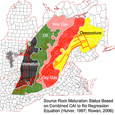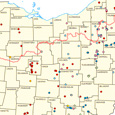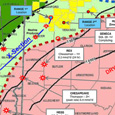Air studies conducted on Marcellus Shale sites across Pennsylvania
Thursday, February 3, 2011
HARRISBURG, Pa. — The Department of Environmental Protection released a report on a four-week air quality study conducted near Marcellus Shale natural gas operations in Susquehanna and Sullivan counties.
“This short-term study of the air emissions at surveyed sites shows no emission levels that would constitute a concern to the health of residents living near these operations,” said Department of Environmental Protection Director of the Bureau of Air Quality Joyce Epps.
Sampling procedures
The report notes that the sampling effort was not meant to address potential cumulative impacts. Department of Environmental Protection’s assessment focused on concentrations of volatile organic compounds, including benzene, toluene and xylene, which are typically found in petroleum products.
The department also sampled for other pollutants such as carbon monoxide and nitrogen dioxide near natural gas extraction and processing sites.
The sampling was conducted the weeks of Aug. 9, Sept. 13, Oct. 14 and Oct. 25 with an evening sampling event held Oct. 6.
The Department of Environmental Protection’s mobile laboratories were used and the equipment was set up downwind of the target sources during early morning and late evening hours, which is when the department received the most complaints from residents.
The agency collected background samples at Sones Pond in the Loyalsock State Forest in Sullivan County. The air monitoring surveys near natural gas operations in Susquehanna County were conducted at a completed and operating gas well on Carter (Cabot’s Gesford 2V/7H) Road in Dimock Township; two compressor stations (Cabot’s Lathrop and Teel stations near Springville); and at a well site being fracked (Stone Energy’s Loomis well site) near Lawton.
Those surveys detected the main constituents of natural gas — including methane, ethane, propane and butane — as well as low levels of associated compounds such as MtBE (methyl tert-butyl ether), carbon monoxide and methyl mercaptan, the odor-producing compound.
In addition, the Department of Environmental Protection used a specialized infrared camera that can detect emissions of certain pollutants from a source that otherwise may be invisible to the naked eye.
Detected emissions
The equipment did detect fugitive and direct emissions from the well equipment at the Carter Road site.
Overall, the Department of Environmental Protection’s air sampling did not find concentrations of any compound that would likely trigger air-related health issues associated with Marcellus Shale drilling activities in the northeast region.
Other sites. The Department of Environmental Protection also conducted similar air-monitoring studies near Marcellus gas facilities in north-central Pennsylvania. Those results are currently being evaluated.
Results from a study in southwestern Pennsylvania were announced in November 2010.
To view the report, visit www.depweb.state.pa.us and click on “Regional Resources,” then on Northeast Region and choose the “Community Information” link on the right side of the page.




